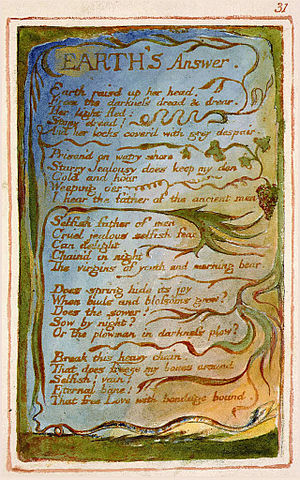August 27, 2021: Difference between revisions
From Gerald R. Lucas
m (→Works Cited: Removed isbn.) |
m (Added template.) |
||
| Line 51: | Line 51: | ||
{{Refend}} | {{Refend}} | ||
{{Links-Blake}} | |||
{{2021}} | {{2021}} | ||
Revision as of 09:46, 4 September 2021
|
Earth raised up her head |
Notes & Comentary
- ↑ From the Songs of Experience, 1794, which, along with “Introduction,” defines the “emotional conditions” of the poems in this book (Tomlinson 1987, p. 27). Here, the earth decries unnatural restrictions placed on the act of love by the “Selfish father of men,” and class on him to “Break this heavy chain” of moral bondage that perverts the natural world. The Earth further answers the call in “Introduction” for "the lapsèd soul” to turn back to God is also unjust.
- ↑ A reference to the God of the Old Testament, whom Blake considered tyrannical and jealous, always attempting to intimidate and control humanity. In Blake’s mythology, this god is named Urizen, characterized by reason and the imposer of moral bondage (see Tomlinson 1987, pp. 28, 47 and Greenblatt 2018, p. 55).
- ↑ See the last stanza of “Introduction.”
- ↑ Restrictions on love that morality imposes can corrupt that love, making it shameful (Tomlinson 1987, p. 28).
- ↑ I.e., all of life’s joys are perverted by unnatural restrictions placed on them.
Works Cited
- Battenhouse, Henry M. (1958). English Romantic Writers. New York: Barron’s Educational Series, Inc.
- Gardner, Stanley (1969). Blake. Literary Critiques. New York: Arco.
- Greenblatt, Stephen, ed. (2018). The Norton Anthology of English Literature. The Major Authors. 2 (Tenth ed.). New York: W. W. Norton.
- Tomlinson, Alan (1987). Song of Innocence and of Experience by William Blake. MacMillan Master Guides. London: MacMillan Education.
